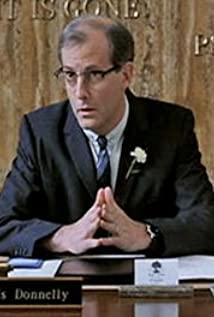Modernity and the Will of Director
From the textual point of view, the superficial story of "A Place of Nowhere" lacks a problem that seems to need to be solved. First of all, it needs to be acknowledged that all the old forms of life of the {wagon family} have appeared. All kinds of situations, and it is true that the problems that need to be solved inside absolutely exist, but the solution is not directly given in the movie, nor is it even in the context of the bourgeois world inside the movie, or outside the movie. In the context of capitalism throughout the world.
Looking back at the beginning of the story, it originated from the actual blow to the US manufacturing industry by globalization and the 2008 financial crisis. The town of Empire is undoubtedly one of the typical giant companies that exist in both China and the United States ( In the movie, the satellite town established for the United States Asbestos Company (USG) was due to the fact that cheaper labor resources were found in the third world and regions, coupled with the sudden demand for plasterboard in the sluggish real estate market after the 2008 subprime mortgage crisis. When the time drops, it will inevitably lead to the optimal solution of closing high-cost domestic companies in the cost strategy. Of course, this is also an era in which individuals and small organizations will inevitably encounter in the current global field of material exchange, from the vigorously small and closed to the standard machinery. It is an indelible scar of modernity.
When applied to the protagonist, Finn, in addition to the work that he depends on for survival, and the disintegration and dying together with the excellent middle life, there is also the early death of her husband, which means that the closest people have established a meticulous hand in hand with each other. The collapse of the community. This kind of original self-interested bond with natural resistance to modernity genes can bring everyone full satisfaction and fulfillment. In the dimension of life that will surely move forward and stumbling, it is also a powerful protection against external harm. shield.
This logically linked the relationship between unemployment, loss of childbirth, and the disintegration of modern small families in the structural arrangement of "A Place of Nowhere". The solitude is the small result that the family can no longer be the pillar of one person, and it also conforms to the social community. The disappearance of the small town in the habitat is related to the metaphor of small insignificance. As long as the metaphor is established, it must first undergo abstraction and standardization. The sense of reality gradually languishes because of the closed concept, and it also reappears when it is supported by the imaginary community and once again implemented into concrete and small individuals. At this time, the real problem that is covered by the general environment will really appear: since it has approached atomization The two-person family was disintegrated due to irresistible natural and man-made external forces. How will the remaining true atom individual Finn face the problems of life?
The "answer" given by Zhao Ting in the story is obviously a semi-permanent abandonment of modern human civilization. When you see Finn driving a station wagon around the United States for more than half a circle, returning to the small town of Empel again, saying goodbye to the former factory buildings, offices, houses, etc., and going on the road again, I believe you are emotional It seems that the tears of empathy and physical empathy will make you intellectually forget that the previous real problem has yet to be solved. The ending literally means to sublime and complete the mourning of the husband's death and the mourning of the past life style. This seems to solve all the contradictions, but in fact it is only avoiding the solution of the actual problems before. After all, when Finn returned to the town of Empel to say goodbye again, this action was already split by repetition, because at the beginning, it was Finn who said goodbye to the town of Empel and embarked on a wandering journey. This is bound to happen. Asking questions: If the second farewell resolves the problem and contradiction, why can't it be resolved the first farewell? And if it is not resolved the first time, what new meaning does the repeated goodbye have? So the "solution" here is only determined by the fact that Finn has gone through the journey between the two farewells. This boils down to the plot. Before this nomadic style of wagon life is completed, no matter what the problem of the new life of a truly atomized person is, it will not be a big problem. After all, it is just a search process. The series of events to be experienced and the resulting insights are just a matter of finding the direction to face a new life, these insights seem to become memories, which can always guide the future direction. The paradox is that there is no so-called completion of the station wagon life form, because as long as the station wagon stops and does not continue to travel, it no longer has the attributes of station wagon travel, and once it creates a "new" based on the memory of the so-called journey The form of life solves the entanglement that does not actually exist, and ignores the actual problems of the real difficulties of life. If you don’t return to Enpy, you will not change the fact that this context has already happened, so you finally return to the small life that you used to live. The town, as if to say goodbye to the old life, and at the same time to find a new life to continue, the general epiphany will not produce any real meaning, it is just a technically, emotionally big gimmick. Therefore, the real contradiction of this story is not before the farewell, but after the farewell, and is limited to the fact that it cannot walk out of the original form of life and cannot face the new life alone. At this time, facing the fact of doomed failure that cannot be rewritten, this is already atomic. How should each modern person face the truth of capitalist life is a truly effective drama core. Only at this dramatic moment of confronting modernity itself can saying goodbye truly become a decisive question in the face of a new form of life.
And Zhao Ting’s deliberately dramatic suspension (dispelling dramatization) throughout the whole story is obviously unsuccessful. Although the focus of her entire film is only on Sister Cohen, many of them echo back and forth, and the drama-like plots are obviously linked. It's for emotional paving. Regardless of the disregard of emotions, the real individual will inevitably lose focus, and the balance between them will inevitably lead to the actual nihility because of the so-called shit theory of living in the moment that has to be accepted. After all, people don’t have a second chance. Surviving in the world, it is like a person will not step into the same river twice, lacking a base of realism, lacking the support of delicate and perceptual details, and will not help any viewer to extend the realistic imagination. And this comes down to Zhao Ting’s lens language. Many comments say that she looks like Ken Roach or Malik. It must be pointed out here that Ken Roach’s naturalistic lens is really mechanical and designed to move. It's not an open composition (in this regard, "A Place of Nowhere" is very similar), but Ken Lodge's shots are full of indignant left-wing anger, the obvious and revealing planning assumptions, and the cautious approach of the lyrical passages. View, you can see the brilliant ideology in the author’s thoughts, which is undoubtedly what Zhao Ting tried to avoid in "A Place of Nowhere", because what she wants to achieve is more of the perception of natural beauty; for Malik The lens fully implements Heidegger’s existentialism. When you unexpectedly regard nature as the realm where every life will eventually return to disappearance, in fact, if you regard nature as a symbol of death, those who wander, Even the distorted wide-angle lens rejects boundaries, does not set boundaries, and desires to integrate into the evidence of nature. The image is generated in it, and is given the final end of life, which is also the realm of life toward death. This is Zhao Ting’s "A Place of Nowhere "Not in middle school. Although her third film is relatively mature and styled, it lacks a philosophical and powerful perceptual background. In terms of technique, what she is farther away from the two "masters" is editing. Compared with Ken Rocky, she must achieve a sharp ideological output and Malik waits for the image life to exhaust itself before editing. Zhao Ting's editing is obviously more casual, with fleeting emotions and frequent interruptions, which greatly compromises her overall technique.
This dispelling dramatization and mirror language’s four-six-six misunderstandings indicate a deeper problem in the film, because if driving a wagon as a form of life, to find the meaning of facing a new life, imagining the meaning of a new life will be looking for The meaning of the new life arises during the process. Such existentialism is undoubtedly ignoring the difficulties of living in a modern world, and people are inevitably unsolvable in the face of modernization. This is obviously not facing modernity but avoiding it. Because as far as existentialism is concerned, existence precedes essence. In the process of wandering on the journey, Finn actively avoids close connections with others and avoids any re-establishment of intimacy, and at the same time does not want to return to the capitalist civilization. This posture is the best proof that Finn has found meaning in the intentional essence of the new, wagon-style lifestyle , before the natural existence of the wagon-style lifestyle . It seems that every time she has her own free will She has to take all the responsibilities for this, but in fact, this is totally ignoring modern life and wishful thinking of modernity itself, because in the plot, Finn still has to contact others and has to engage in capital. In the production activities of Confucianism, I had to find my sister to borrow money after the car engine was scrapped, and had to return to Empel again to complete the so-called mourning of the dead husband and life. Freedom cannot come at the cost of giving up freedom completely, so the wagon-style lifestyle does not contain the meaning of new life at all. It only appears as a continuation of the seemingly co-production director's style of bringing capital and projects into the group of big stars. In fact Lyrics in the big, unreasonable, empty and boring scenes. When facing the irreconcilable contradiction between man and modernity, eliminating the atomization of man, communicating honestly and frankly, daring to believe in each other, and really trying to create intimacy is the only feasible direction. As for some comments that the greatness of Zhao Ting’s "A Place to Nowhere" is that it foreshadows the United States or the capitalist world directly, the birth of a new {wagon-like nomadic class} is even more full of the decadent stench of capitalism. , Because meticulous labeling and fine division of labor are essentially one of the deepest stubborn diseases of capitalism. With this method, {middle class} and {under "identity politics" have been created out of thin air. Various labels such as African American}, {Asian American}, {LGBT}, etc. The so-called {wagon-style nomads} has a name that is older, louder, and more celebrated by people and times-the proletariat .
And that is another story.
View more about Nomadland reviews










